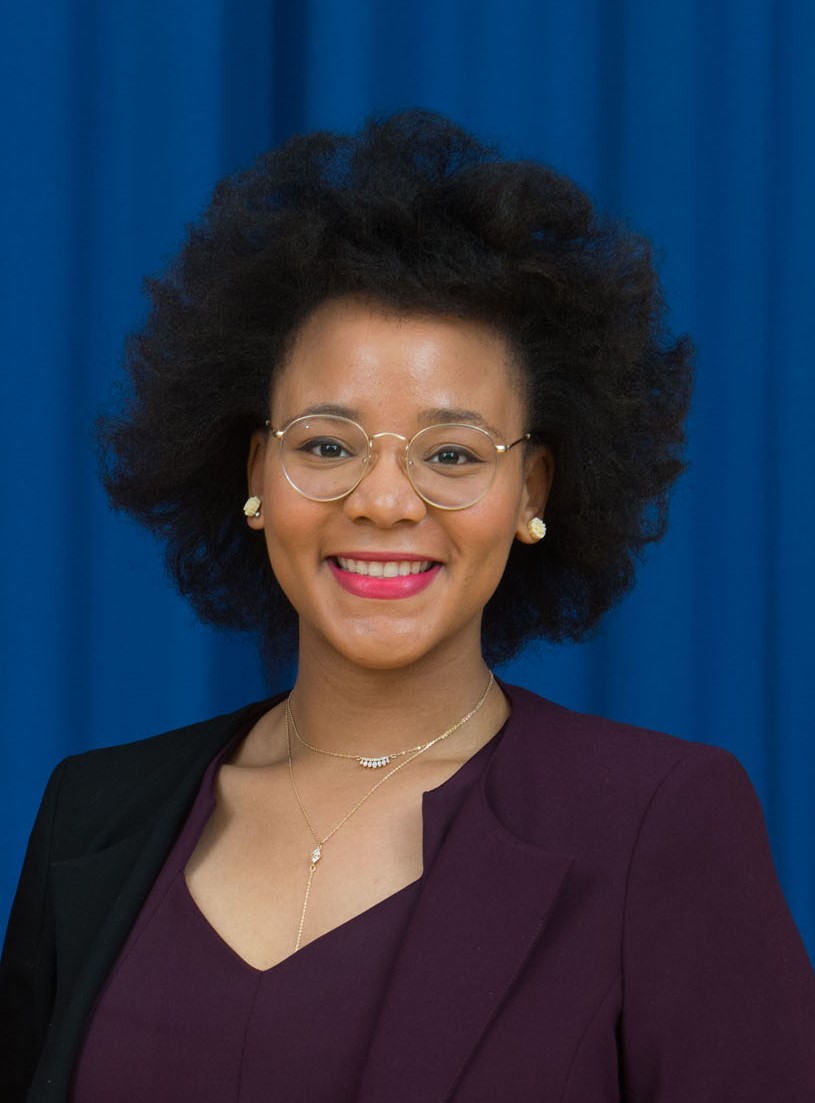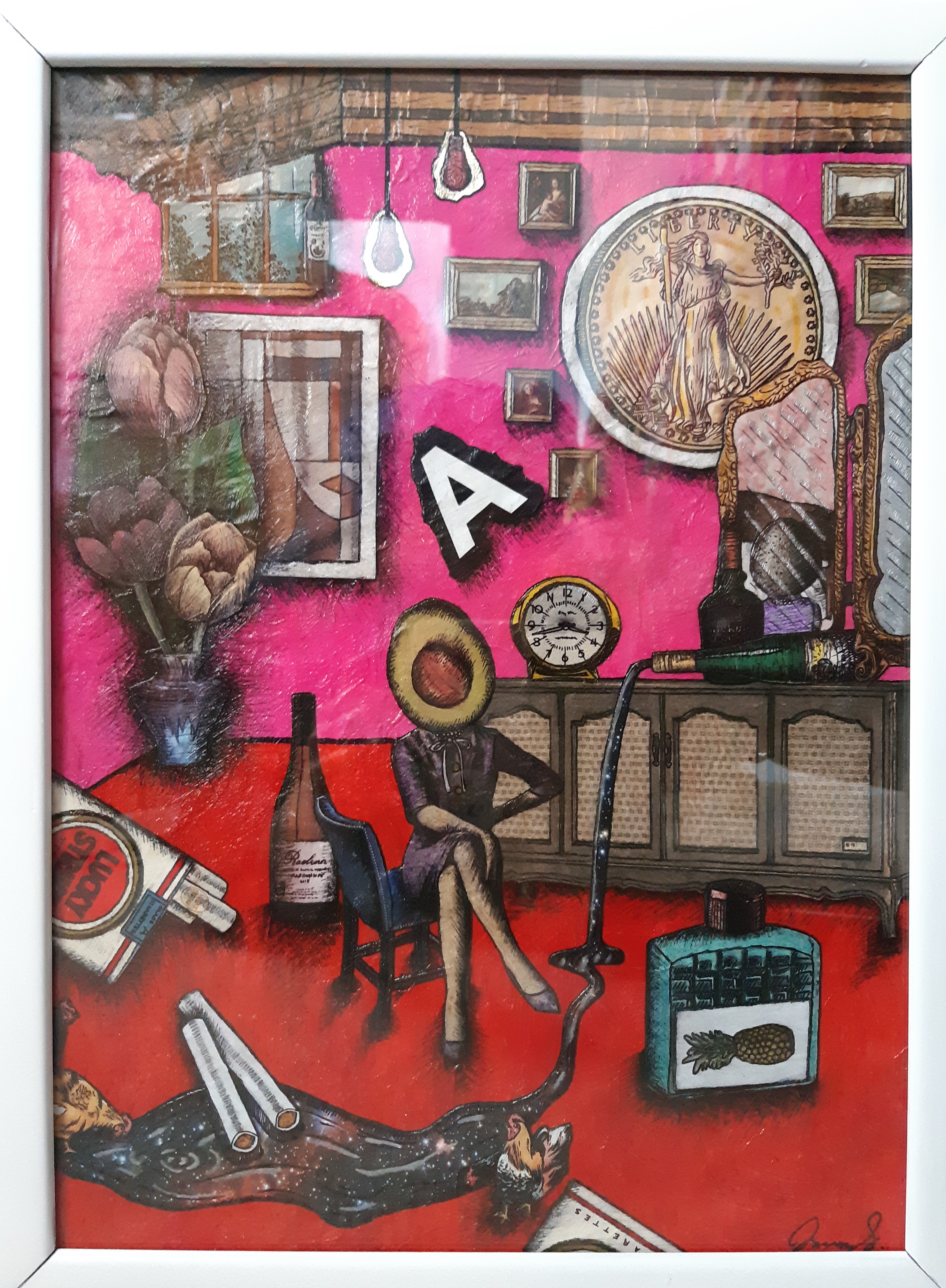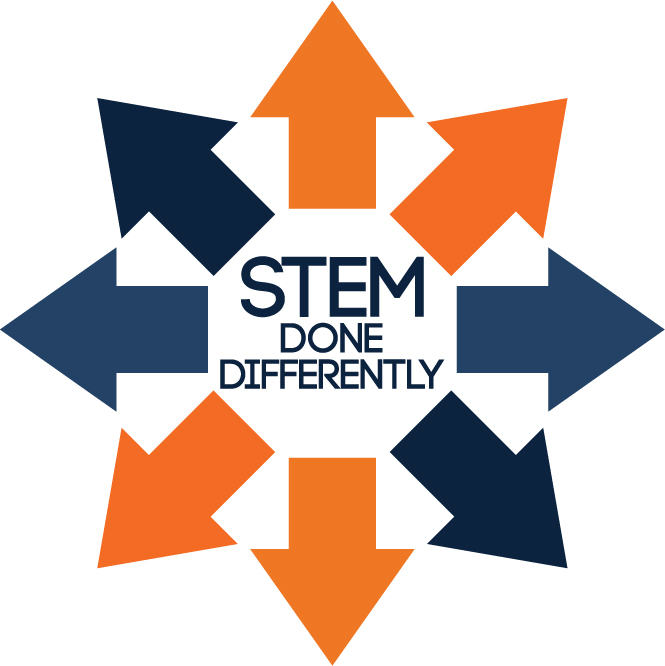Dr. Jamesa Stokes
Unafraid of New Experiences
There is always something that is lost when interacting with another person through the internet compared to interacting in-person. This time, it was the ability for me to see the person I was speaking to. A bit more than eleven minutes into our conversation, I heard through my headphones, “Wait, your mic went out!” Then… silence, intermittently interrupted by a clipped part of a word or a robotic, artificially slowed phrase that barely sounded like the voice of the person I was interviewing. At this point, I could still see Dr. Jamesa Stokes sitting in her bedroom, with a Penn State blanket covering the foot of her bed and a colorful tote bag leaning up against her slate grey painted walls. Green light was reflecting off the lenses of her glasses as her eyes behind them shifted back and forth, mirroring my attempt to deduce from what our current audio problem originated. Eventually, we came to the highly technical solution of turning her video off and proceeding with our discussion with Dr. Stokes’ internet bandwidth entirely devoted to making sure we could hear one another. Despite our internet snafu, we spoke about her upbringing, the path that brought her to NASA’s Glenn Research Center, and societal expectations of Black women. Her story began in Georgia.

Dr. Jamesa Stokes
Jamesa Stokes grew up in the area around Atlanta, Georgia. She said that her family never had a lot of money, and following her mother losing her job at AT&T, she, her twin brother, and her mom moved in with her great grandmother in Bankhead, Georgia. “It’s a poorer area of the city,” Dr. Stokes said, before quickly adding that, “it’s definitely changing now with gentrification… I feel like the next time I go home, it’s going to look completely different.” Despite their financial difficulties, Dr. Stokes’ mother made it a priority to send her children to private schools. As such, Dr. Stokes and her brother attended private schools for the entirety of their K-12 education, which culminated in attending Lovett School from 9th to 12th grade. Important to note about Lovett School is its location: Buckhead, Georgia. A quick online search will find terms like, “upscale,” “trendy,” or “chicly-dressed locals,” describing the North Atlanta district. Despite the similarity in name, Bankhead and Buckhead clearly are not the same. “Making that journey between those two worlds every day, and also making friends in a world that I didn’t necessarily come from,” Dr. Stokes began, “it was very interesting. And sometimes, it was very hard to relate to my classmates… Some of the things I went through growing up, they’re things [my classmates] wouldn’t even worry about.”
Risks
By her senior year of high school, Dr. Stokes knew she wanted to get out of the Atlanta area. She also knew that she would be attending college, in part due to her mother’s insistence, but she was not entirely sure what her path would be. “I loved art, and I did art,” she remembers thinking, “so that’s what I studied my Freshman year.” As a first-year undergraduate student at the University of Kentucky, and despite her love of the field, she put science on the backburner and majored in Fine Art. However, some of the difficulties she experienced at Lovett School followed her to Lexington. “Coming from a family with not a lot of money, I didn’t have a car, so I couldn’t get around the city very well,” Dr. Stokes said. Moreover, flying back home from the small Lexington airport was expensive, and whereas she did have some friends at Kentucky, most had fallen away by the end of her second semester. The result of these conditions was that Dr. Stokes felt out of place, which led her to her decision to withdraw from the University of Kentucky after the completion of her second semester as a Fine Art major. Coincidentally, Dr. Stokes’ brother also left his institution, Sewanee, after his first year.
Dr. Stokes headed back home to Georgia during the summer of 2010 and attained a job as a seasonal worker in a well-known department store. “No matter what, I had already told myself, by the spring of 2011, I need to back in school somewhere,” she said about her thoughts on returning to the academic life. She also mulled over the possibility of attempting late registration over the summer, but was unsure about whether she should continue to solely work at this point. “I knew that college, getting my degree, was the next step,” she began, “eventually when I figure out what I want to do… That’ll take me in that direction.” In addition to working, Dr. Stokes began watching the Atlanta United Football Club play over the time she spent out of school and made friends with fellow fans through an Atlanta United supporters’ group. Moreover, she also helped out at her at-that-time-stepfather’s convenience store. Yet, the thought that her success depended on her returning to college did not leave her. “I think that keeping myself busy, but still having that thought in the back of my mind, helped keep me sane over that semester.” One could say, taking Dr. Stokes’ position, that she took a big risk when she withdrew from the University of Kentucky.
One could also say she took a risk when she reapplied to college during the fall of 2010. “I just applied to Auburn, I don’t think I applied anywhere else,” she said. Auburn University spoke to her because it was closer to home than was Kentucky, yet it still was not literally at home. Moreover, a family friend of theirs was an Auburn superfan, and his full-hearted recommendation did not seem to hurt. Attending Auburn was a different experience for Dr. Stokes, such that she felt much less isolated, considering she had high school classmates who were also enrolled there, which led to a better environment for making friends, attending various social events, and a sense of comfort to branch out more often. In a different vein, the Polymer Fiber department afforded her the opportunity to study abroad in Germany, which was yet another boon to her experience at Auburn. “I just remember that moment so vividly, getting off the plane and trying to make my way to the university,” she said, before telling a story characterized by two large suitcases, multiple busses and helpful Germans. Considering that this was the first time she had step foot outside of the US, she was somewhat overwhelmed, but once she arrived to her dorm, she had an incredible experience, both socially and academically. In fact, after getting to know her fellow exchange students, Dr. Stokes even met back up with one of her French colleagues when she would later return to Germany as a Fulbright scholar. Considering her origins are in the Southern US, there was another aspect of European life that stood out to her: “I remember being fascinated with the fact that they have awesome public transportation everywhere!”
Rewards: Projects
In between her study abroad and Fulbright scholarship trips to Germany, Dr. Stokes had another incredible opportunity, though this one was located a bit closer to home. “I graduated from Auburn, then two weeks later I moved to Cleveland for my internship,” she began, speaking about a summer internship she completed at NASA’s Glenn Research Center. While there, she was mentored by Dr. Frances Hurwitz, a recently retired scientist who devoted 40 years of service to Glenn. “She worked very hard, she knew what she was talking about, but at the same time, if she thought something could be done better, she would welcome input,” Dr. Stokes said about Dr. Hurwitz (whom she calls Fran), before finishing, “… It was a great opportunity to work for her.” Throughout her career, Dr. Hurwitz advocated for others who had been marginalized to get their foot in the door, and as a mentor, she possessed the sensitivity to understand and support folks who are not members of the dominant culture. Fortunately, Dr. Stokes did not experience any negative events of this type while working under Dr. Hurwitz, though she did once when she was presenting a poster at an academic conference. Afterwards however, her colleagues were validating and supportive, which gave her an even more positive viewpoint on her place within the Glenn Research Center.
Originally, that time Dr. Stokes spent with NASA was a way for her to continue to gain experience before heading back to Germany for her Fulbright scholarship. It became much more after she returned. “I told [Fran] when she was retiring that I felt very grateful that people thought that I would be able to fill her shoes, in the role that she had for the longest time.” Dr. Stokes was sworn in as a civil servant in the fall of 2018 and works in the Environmental Effects and Coatings Branch of the Materials and Structures Division at Glenn. Essentially, she synthesizes materials to protect vital engine parts in extreme environments, for example the vacuum of space. “My main project is very closely related to what my thesis work was about,” she began, “which is thermal and environmental coatings for gas turbine engines.” Dr. Stokes’ work allows for engines to run hotter, thus improving fuel efficiency and reducing harmful emissions, in addition to protecting against the ingestion of dust and other particulate matter into these engines. Other projects she is currently working on include finding ways to reduce lunar dust adhesion to surfaces important to spaceflight and Dr. Hurwitz’s previous work, which involved inorganic aerogels and aerogel composites for thermal barriers and thermal protection systems.
Rewards: People
However, work with inorganic aerogels was not the only aspect of work that Dr. Stokes inherited from Dr. Hurwitz. “An unexpected duty of [my position] is taking over the technical advisor duties for the two grad students that Fran had,” Dr. Stokes said. By the time she had been given this role, she had gotten to know these grad students and they had gotten to know her, so the transition period was not a difficult one for anyone involved. Moreover, Dr. Hurwitz had offered to help in any way Dr. Stokes needed, so both the students and Dr. Stokes were well supported in the process. When asked about what her mentorship philosophy is specifically, Dr. Stokes paused for a moment before responding. “Oh, man… So, I’ve never actually, really thought about it!” Despite this, she told a few stories that made it evident she is what is called a servant-leader. In other words, it appears that Dr. Stokes’ drive to serve the greater good emerges through her mentoring such that she fosters good relationships with her mentees, and thus ensures that her mentees not just grow in their scientific ability, but as holistically-defined people. An especially illuminating example she gave was her mentoring relationship with an undergraduate mechanical engineering student who had recently been brought on as an intern. Sadly, Dr. Stokes’ colleague who had originally hired this undergraduate student had died, but Dr. Stokes deftly stepped into the role of unofficial mentor. Despite that what she does is not, in fact, mechanical engineering, Dr. Stokes consistently made an effort to foster an engaging and interesting internship experience for this student. “To this day, she tells me she had a great time, so that’s what matters.”
Considering her perspective on what makes a mentor, it was unsurprising to hear Dr. Stokes’ thoughts on self-care, which is a viewpoint she said emerged during her graduate education. “Grad school is hard enough,” she began, “and if you’re not taking time for yourself, you’ll go crazy.” A statement that I entirely understand. She continued, “even outside of grad school, there’s often this ideal, especially for Black women, that self-care is almost like a bad word. Running yourself ragged for people… I saw that with my mom. Certain things that she would do, even up to this day… I’m like, ‘there’s no reason for me to give more of myself in any capacity to any endeavor that I’m not also providing that same amount to myself.’ It’s not helpful for you...” She paused for a moment, “well, how are you going to help anyone if you’re dead?” She then went on to emphasize the importance of personal and professional boundaries and the ability to self-advocate for others to respect these boundaries. Of course, another important aspect of self-care is using one’s free time in a way that is meaningful to them. “Recently, I’ve been doing a lot of art again. Once COVID hit, I realized I hadn’t made art in a very long time, like actually put something on paper, making something.” You can see a product of her renewed interest in creating art below. Altogether, Dr. Stokes loves working with her hands, so she also finds respite in cleaning up and organizing her spaces, in addition to a recent project she has begun, restoring a 100-year-old sewing machine.

Untitled Collage - Dr. Jamesa Stokes, 2021
As our discussion drew to a close, Dr. Stokes provided insight into what she would say to a younger student looking to enter the STEM fields. “If I were to give someone in my position, someone like me but much younger advice, I would want to instill… No matter who you are, you have the capacity for greatness. Sure, there are societal problems, like socioeconomic status [disadvantages]… Even if you have all these issues, I never want someone to feel that anything is out of their reach.” As a final note, she added, “don’t be afraid of new experiences.”
Dr. Stokes wasn’t. Things seem to have turned out pretty well for her.

By Matt Gonzales
I'd like to thank Dr. Jamesa Stokes for sitting for an interview with me.

